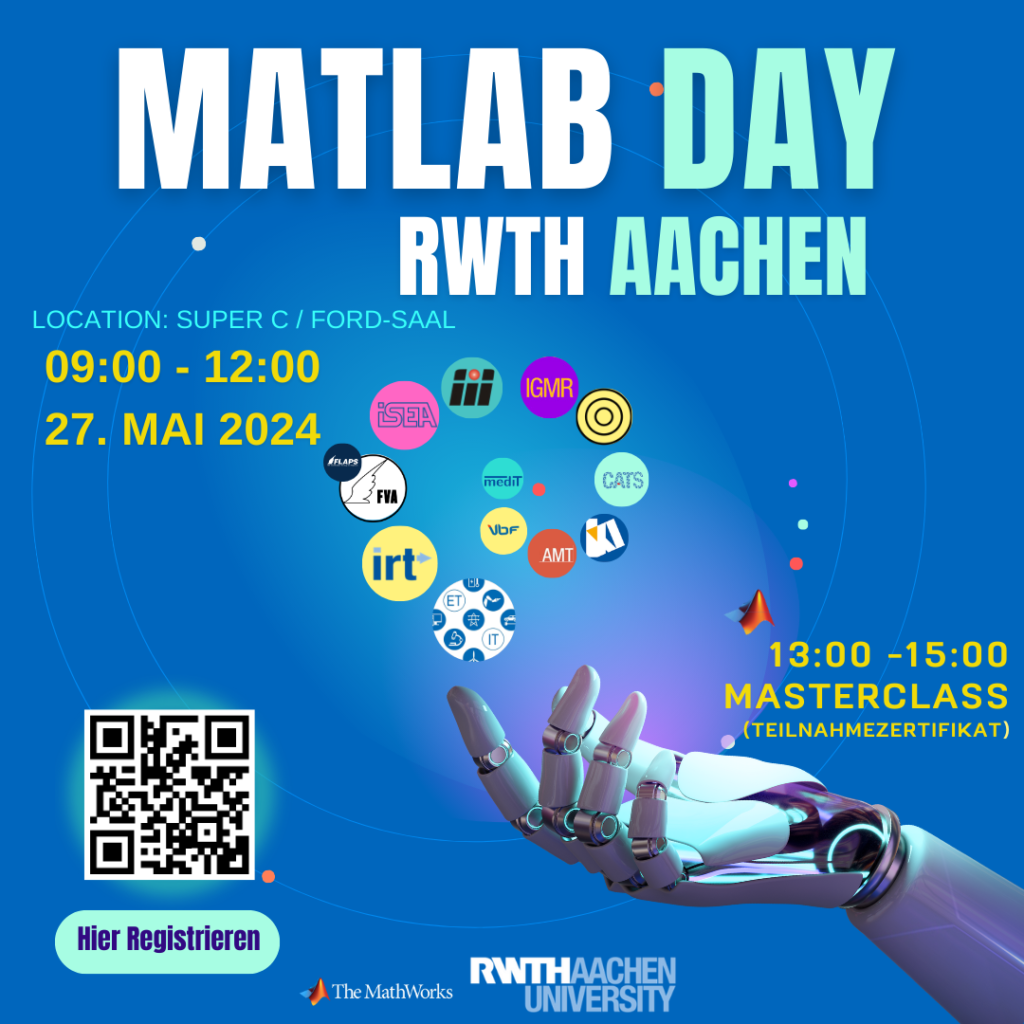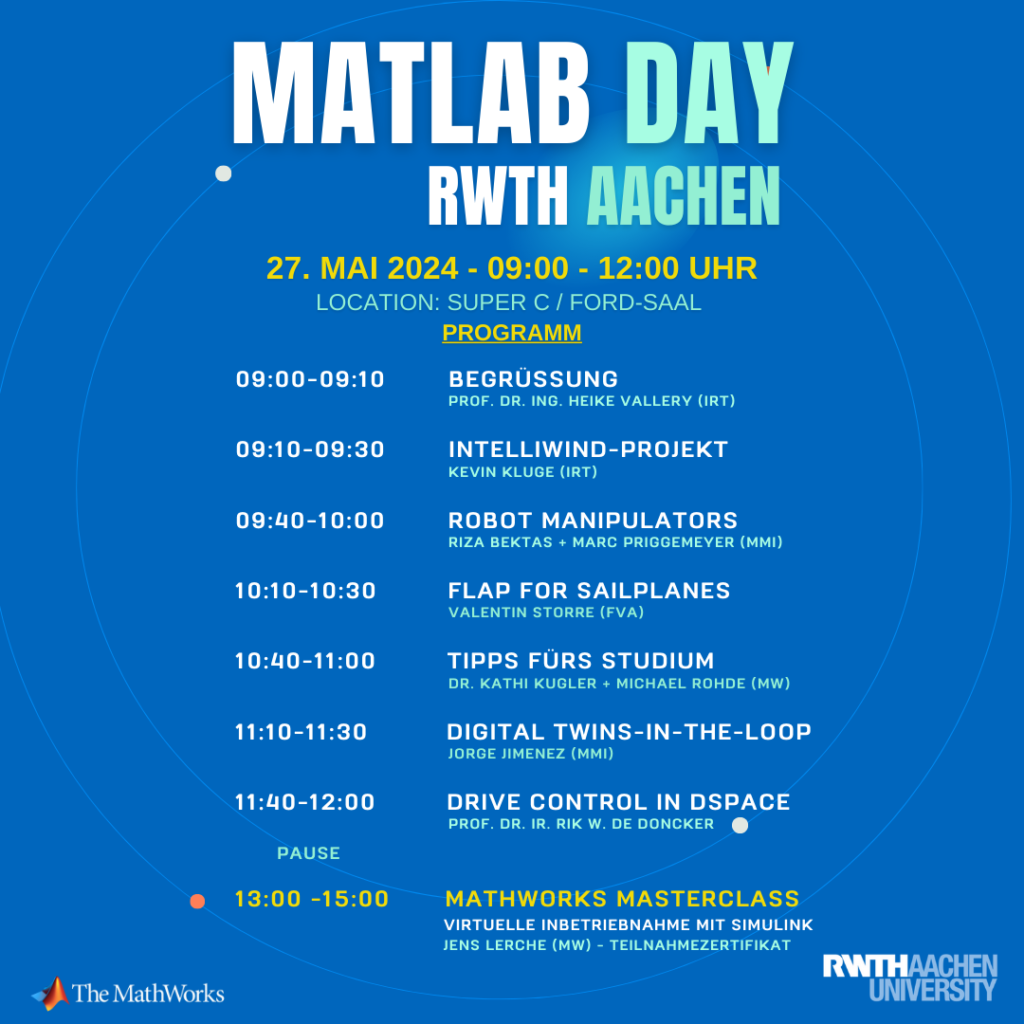Schlagwort: ‘RWTH’
Four RWTH researchers admitted to the German Academy of Engineering Sciences
The German Academy of Science and Engineering, acatech for short, has accepted four scientists from RWTH Aachen University as new members: Fabian Kießling, Max Lemme, Constantin Häfner and Walter Leitner.
acatech is the central voice of technical sciences in Germany and is funded by the federal and state governments as a national academy. It advises politicians and society independently, factually and in the public interest on issues relating to shaping the future of technology. Its members come from the fields of engineering and natural sciences, medicine, and the humanities and social sciences. The patron of the academy is the Federal President.
With the admission of the four new members, a total of 35 scientists from RWTH Aachen University are now part of acatech. In addition to Professor Max Lemme, Professor Rainer Waser, Professor Dirk Uwe Sauer, Professor Jürgen Roßmann, Professor Rik W. de Doncker and Professor Steffen Leonhardt from the Faculty of Electrical Engineering and Information Technology are also members of the academy.
Max Lemme: Research into the electronics of the future
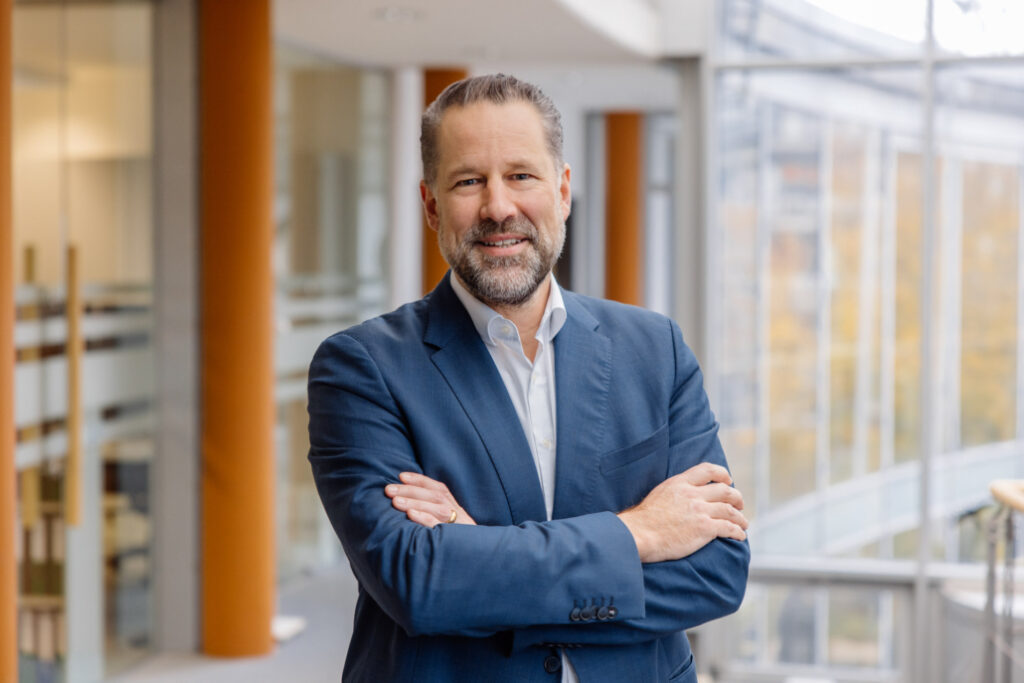
© Martin Braun
Professor Max Lemme holds the Chair of Electronic Components at RWTH Aachen University and is managing director of AMO GmbH. His research focuses on novel electronic and optoelectronic components based on two-dimensional materials such as graphene. The aim is to integrate these materials into future micro- and nanoelectronics, sensor technology and neuromorphic computing systems. Lemme is also spokesperson for the NeuroSys future cluster.
In addition to him, three other outstanding researchers from RWTH Aachen University were accepted into acatech: Professor Fabian Kießling, Director of the Helmholtz Institute for Biomedical Engineering and pioneer of molecular imaging, Professor Constantin Häfner, Director of Research and Transfer at the Fraunhofer Society and expert in high-power lasers, and Professor Walter Leitner, Chair of Technical Chemistry and Petrochemistry and Director at the Max Planck Institute for Chemical Energy Conversion.
Their admission recognises their scientific achievements and their contribution to the further development of technical sciences in Germany.
Back to the roots
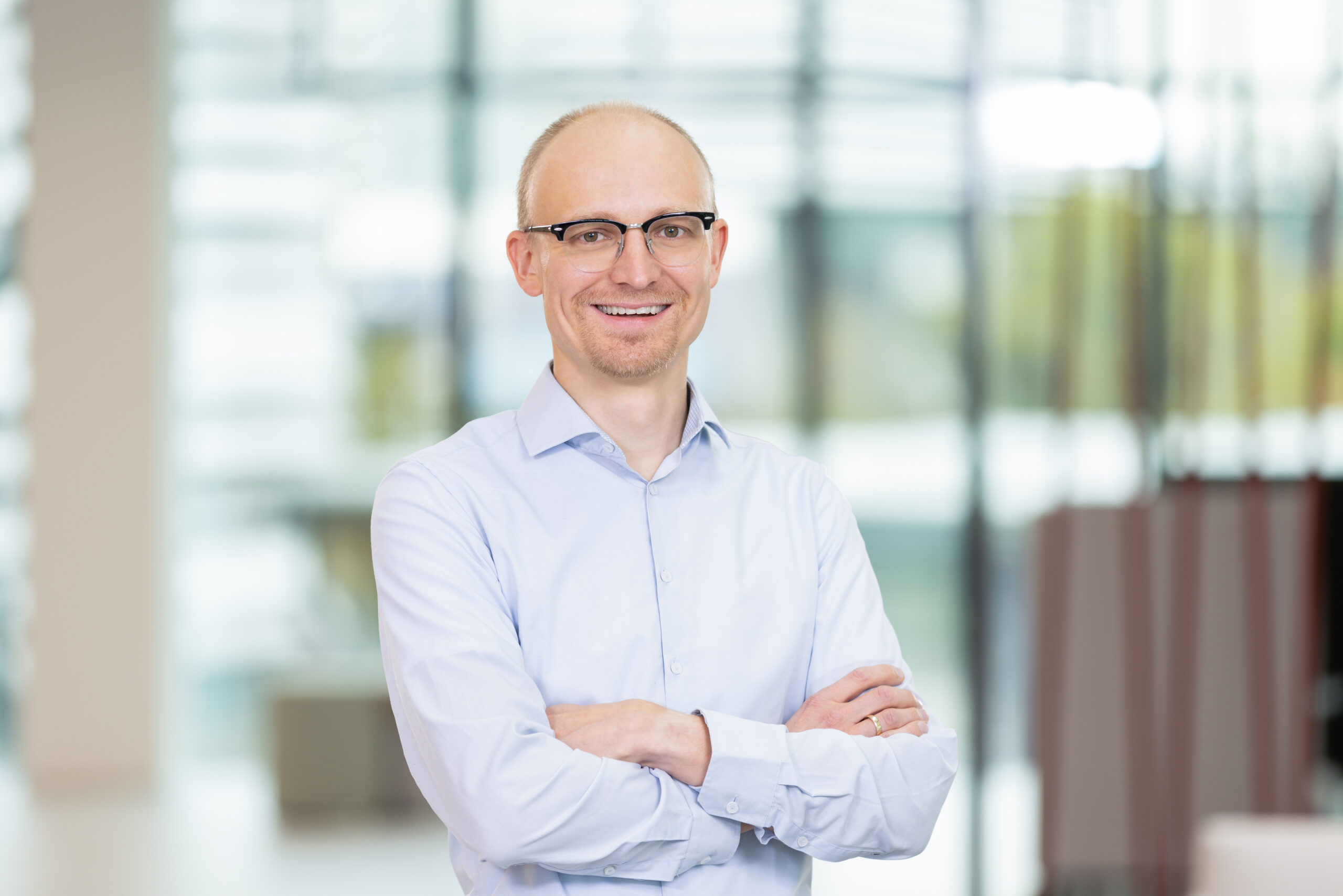
Professor Simon Steentjes, a former student of RWTH Aachen University and the current holder of the Chair of Electrical Machines and Drives ©Christian Schneider
Professor Simon Steentjes returned to his academic roots in October 2024 to become holder of the Chair of Electrical Machines and Drives.
The 37-year-old professor’s passion for technology was cultivated during his childhood, and led him to RWTH Aachen University for the first time in 2006. Here, he successfully completed his studies in Electrical Engineering and Information Technology, subsequently earning his doctorate under the supervision of his predecessor, Professor Kay Hameyer.
„I learned from an early age to repair things instead of throwing them away. My father showed me everything as a child. We often tinkered until things worked again,” recalls Professor Steentjes.
It was these formative experiences that not only ignited his enthusiasm for technology, but also instilled in him a strong commitment to sustainability.
„I want to leave behind a world worth living in for my child and future generations; thus, I consider sustainable development within electric machines and drives absolutely essential,” states the electrical engineer.
Electrical machines are indispensable for numerous applications – from industrial facilities, mobility solutions, and household appliances to energy supply systems. As such, enhancing the efficiency of electric machines and drives represents a significant opportunity for reducing CO₂ emissions – a crucial step toward protecting our climate, according to Steentje. He emphasizes that ongoing research and innovation are essential to enhance power density, torque density, efficiency levels, and manufacturing techniques while maintaining resource efficiency when integrating new technologies. Steentjes believes that we also need to gain a deeper understanding of the materials and resources used to manufacture our electrical machines to optimize their sustainability and efficiency. The use and production of magnetic materials alone – integral components found within every electrical machine – offers vast potential for optimization that must first be thoroughly understood by researchers like himself.
„To date, little attention has been paid to the advances made by the various disciplines involved or to specific components. While manufacturing technology evolves rapidly, these advancements must also inform production methods and design choices surrounding electric machines to harness opportunities for improved efficiency fully,“ the engineer points out.
Simon Steentjes is a researcher through and through. He relishes engaging with fellow researchers on pressing questions while finding solutions collaboratively, often alongside students and doctoral candidates – a dynamic he finds immensely rewarding. For him, working with young minds means fostering fresh ideas that keep him on the cutting edge. He finds it wonderful to be back in teaching.
The electrical engineer returned to academia having worked in industry before. At Audi, he was actively involved in e-mobility from the very beginning. Later, at Hilti, he took on the role of head of electric motors and drive technology in 2022, leading the development of a new electric motor platform for power tools, from concept to mass production, among other initiatives. During this time, Professor Steentjes experienced how crucial practical feedback is for designing and developing electrical machines, particularly in addressing the needs and challenges inherent of series production.
During his time in industry, he supervised around 20 doctoral theses. Publishing scientific work remained a priority for him despite his time away from academia – a clear indication that he always intended to return. Steentjes considers himself lucky to have turned his hobby into a career. He believes it’s important to do what makes you happy. And it is this attitude that he passes on to his students:
„As a professor, you have a responsibility to equip the next generation with knowledge, to motivate and encourage them to trust in their own abilities.“
He has now found his way back to academia. His return means also a personal success: Returning to RWTH Aachen University was a very personal mission for him, which he worked towards with the help of his family. The support of his family is particularly important to the husband and father. And when he’s not researching new electrical machines or drives, he likes to work with his son on motorising Lego vehicles.
Day of Electrical Engineering and Information Technology 2024
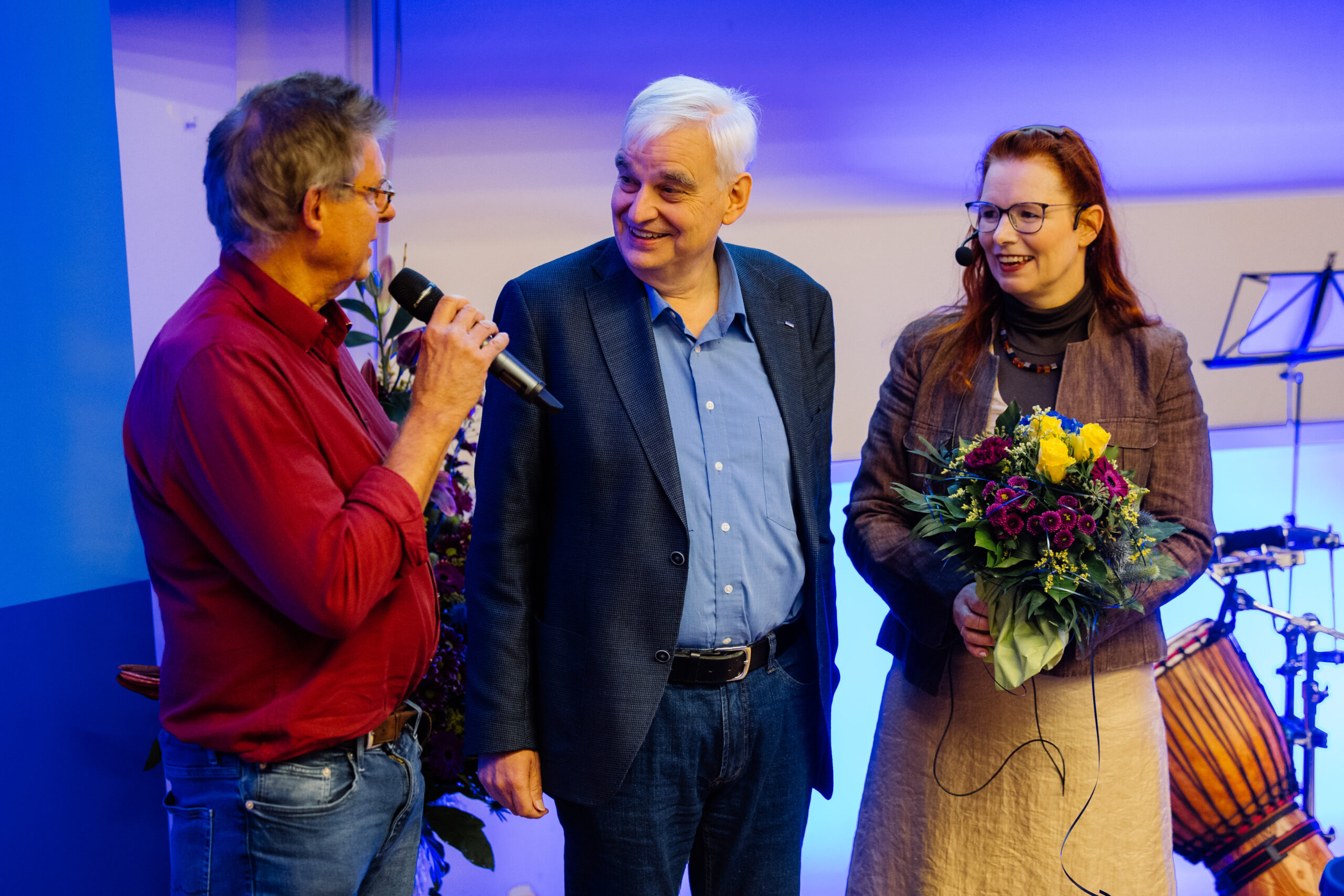
After five and a half years in the role of Dean of the Faculty of Electrical Engineering and Information Technology, Professor Jens-Rainer Ohm (left) was given a ceremonial farewell. The farewell was given by Managing Director Martina Dahm (right) and the new Dean of the Faculty, Professor Albert Moser (centre). © Martin Braun
On the 25th Day of Electrical Engineering and Information Technology (TDEI), which took place on 22 November 2024, we presented our success this year and once again brought together companies, students, faculty members and graduates.
The Faculty of Electrical Engineering and Information Technology at RWTH Aachen University has a longstanding reputation as an institution that produces highly qualified and responsible engineers, a reputation that has been established over the course of five decades. This is corroborated by the faculty’s consistent performance in national and international rankings, in which it consistently ranks at the top. The Dean of the Faculty, Professor Albert Moser, commenced proceedings at the Electrical Engineering and Information Technology Day with a review of the preceding year and the welcoming of new professors to the Faculty team.
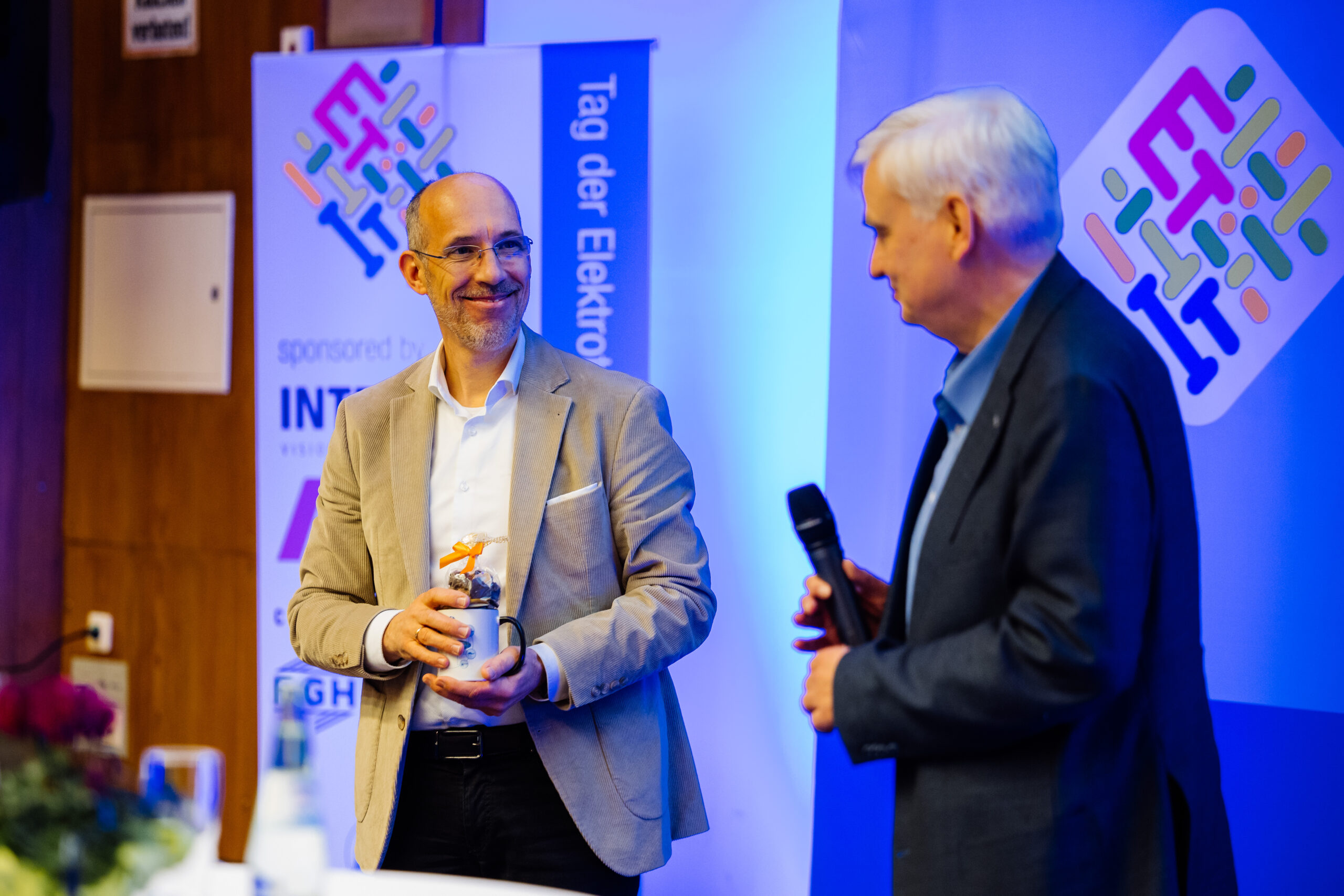
From right: Professor Alber Moser with Professor Volkmar Schulz © Martin Braun
Professor Volkmar Schulz’s expertise in the field of image processing enriches the research in biomedical engineering. He previously led the “Physics of Molecular Imaging” group at the Institute for Experimental Molecular Imaging and is now the head of the Institute of Imaging and Computer Vision at the Faculty of Electrical Engineering and Information Technology, a role he assumed in September 2024.
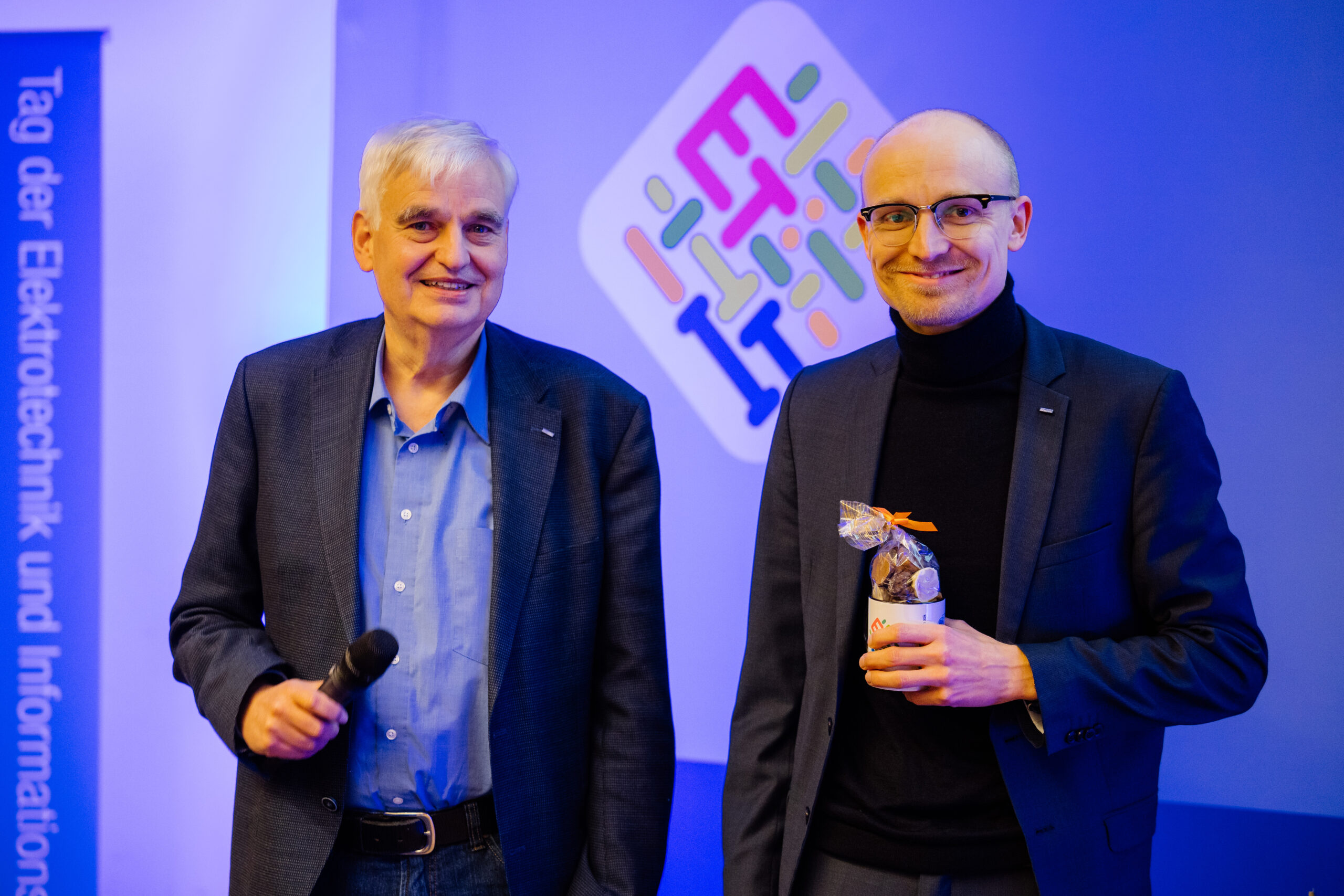
From right: Professor Simon Steentjes and Professor Albert Moser © Martin Braun
Professor Simon Steentjes had been pursuing the objective of returning to RWTH Aachen University for a considerable period of time, as part of his personal mission.
„Working with young minds fosters fresh ideas that keep me attuned to current developments. It’s wonderful being back in teaching“, says Professor Steentjes, who assumed the role of head of the Institute of Electrical Machines and Chair in Electromagnetic Energy Conversion in October.
Having previously held leading positions at Audi AG and the Hilti Group, Professor Steentjes has many years of experience in the industry.
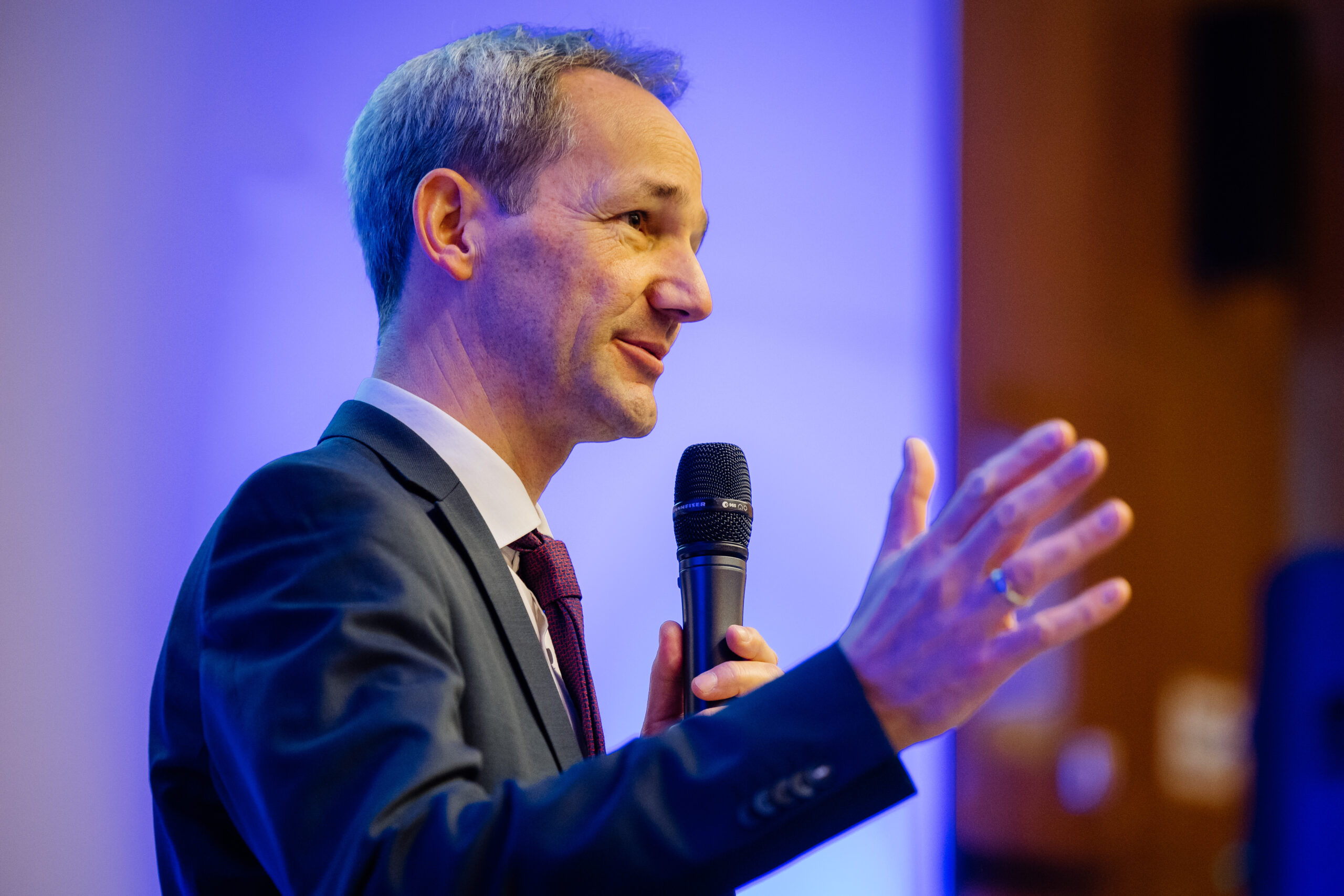
Professor Peter Jax © Martin Braun
Another item on the programme was the report presented by the Dean of Studies, Professor Peter Jax, who is also the Head of the Institute of Communication Systems. Based on the results of quantitative surveys, he conducted an analysis of the academic teaching provided within the degree programmes offered by the faculty, identifying potential areas for further development.
Subsequently, Professor Jax presented the Team Award, which was bestowed upon Cinar Algül, Maxim Klosa and Wenjie Zeng for their exemplary contributions. The three students had demonstrated outstanding performance in their work on the Electrical Engineering and Information Technology project, entitled MATLAB meets Lego Mindstorms.
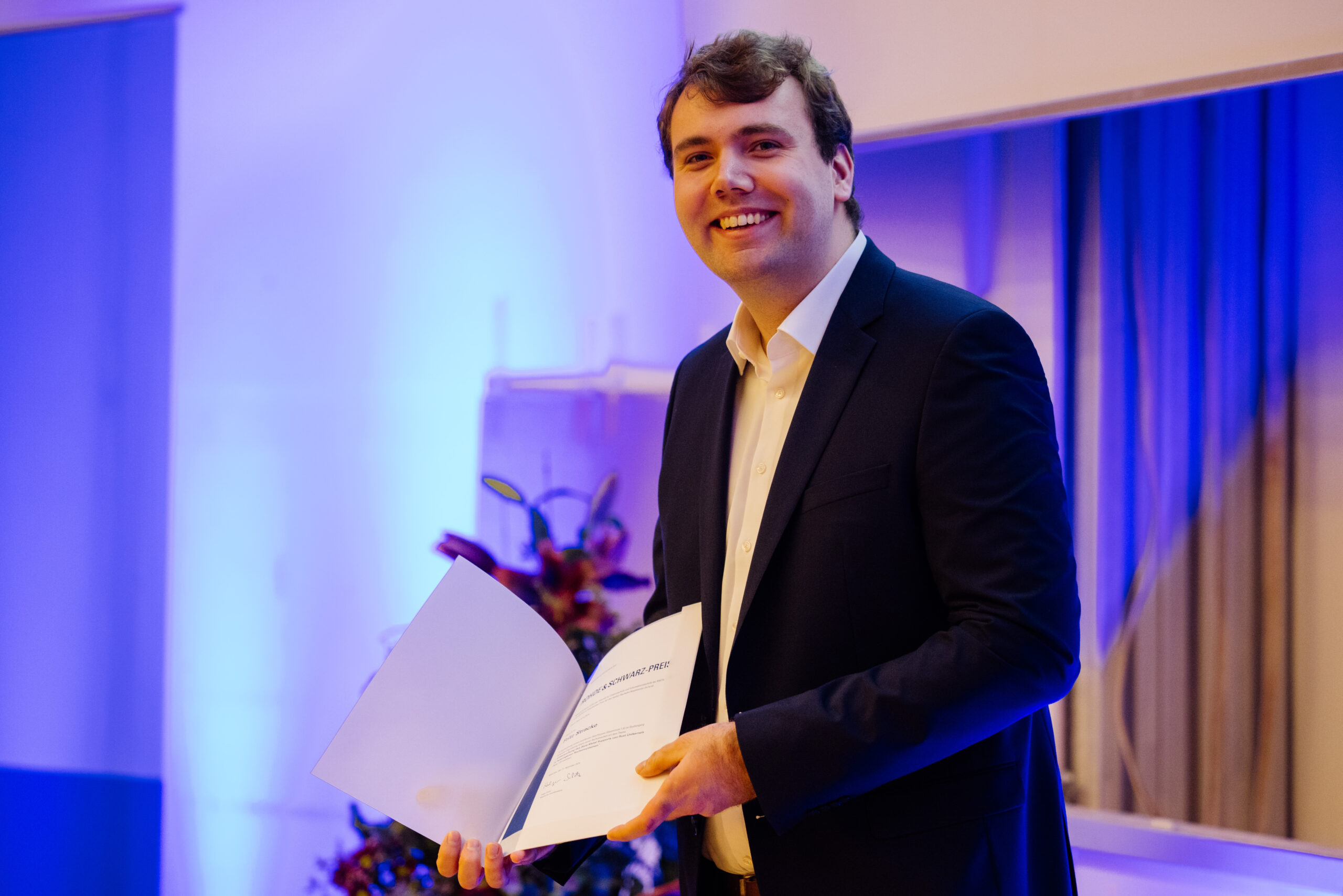
Best Bachelor Award winner Fritz Stracke © Martin Braun
One of the key factors contributing to success is the constructive collaboration with other companies, which provides students with the opportunity to engage in and contribute to challenging projects and theses. At the TDEI event, Gold sponsor Intravis participated in an interview. Furthermore, the Rohde & Schwarz Best Bachelor Award was bestowed upon Fritz Stracke in the current academic year. The student, who is also distinguished by his dedication to the student council for electrical engineering and information technology, was recognized for his bachelor’s thesis, entitled “Investigation of the bare-metal support of Rst Unikernels in heterogeneous computing systems”.
Another noteworthy feature of the event was the keynote address delivered by Professor Andreas Hierlemann from ETH Zurich, entitled “Interfacing with brain cells at subcellular resolution”. The interview with Professor Sven Ingebrandt, Head of the Institute of Materials in Electrical Engineering 1 at RWTH Aachen University, and the presentation of the key visual and the institute’s projects also provided valuable insights.
The graduation ceremony marked the traditional conclusion of the event. After the graduates were introduced by name on stage, the Dean congratulated each of them on their academic success.
Professor Antonello Monti expressed his gratitude to the students in a unique manner. He once caused a great deal of excitement at the TDEI 2019 with a surprise performance. In the current year, he reappeared on the stage in the company of the ERC Band. Two musical compositions, “Knockin on E.ON’s Door” and “AC to Hell”, were presented as part of the performance.
We would like to express our gratitude to all faculty members and assistants, as well as the RWTH International Academy, for their contributions to the organisation and implementation of the Electrical Engineering and Information Technology Day.
Further details regarding TDEI 2024, along with photographic documentation of the event, can be accessed on the official website.
Birthday edition of the RWTH Science Night ‘5 to 12’
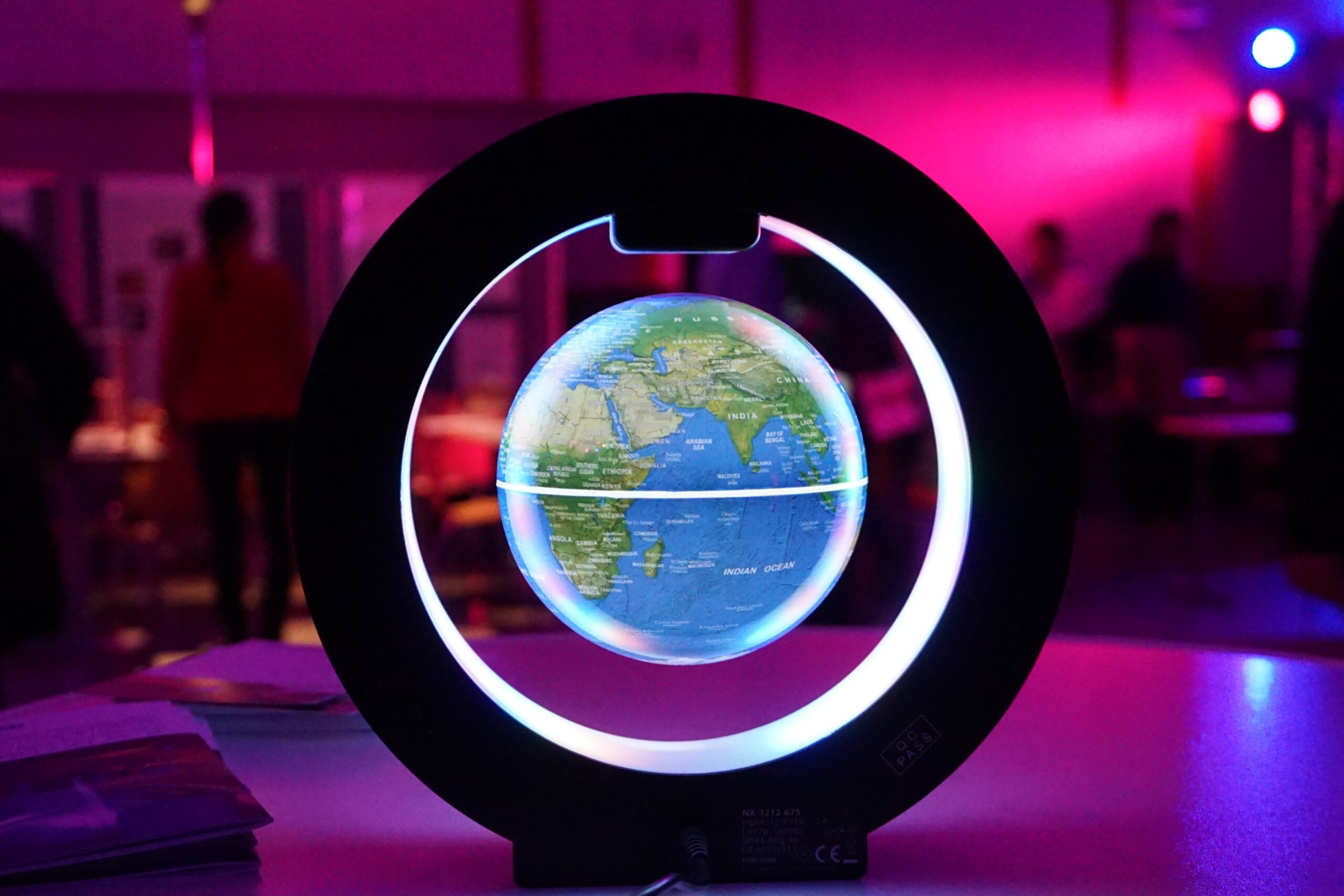
The magnetic globe rotates weightlessly on its own axis – just like in outer space
For the 20th time, RWTH Aachen University offered a glimpse behind the scenes. This time, 7,200 visitors, including many children, came to the C.A.R.L. auditorium between 6 p.m. and midnight to experience the world of research at close quarters.
What started out as a modest idea to present science at an unusual time, in an entertaining way and free of charge to anyone interested, has grown over the past 20 years into a mega-event that not only attracts thousands of guests, but also inspires the members of the university involved. Once again, the team of the Faculty of Electrical Engineering and Information Technology welcomed curious children of all ages and were on hand to help them with experiments.
With questions such as “Why isn’t the light on now?”, “How does that work?” or “Can I do one more experiment?” younger children followed their natural urge to discover new things.
The programme included reconstructing electrical circuits where they could visualise electric current as light or movement. They made switches, explored the magnetic and thermal effects of electricity, learned to distinguish between conductors and non-conductors, and finally became familiar with electricity.
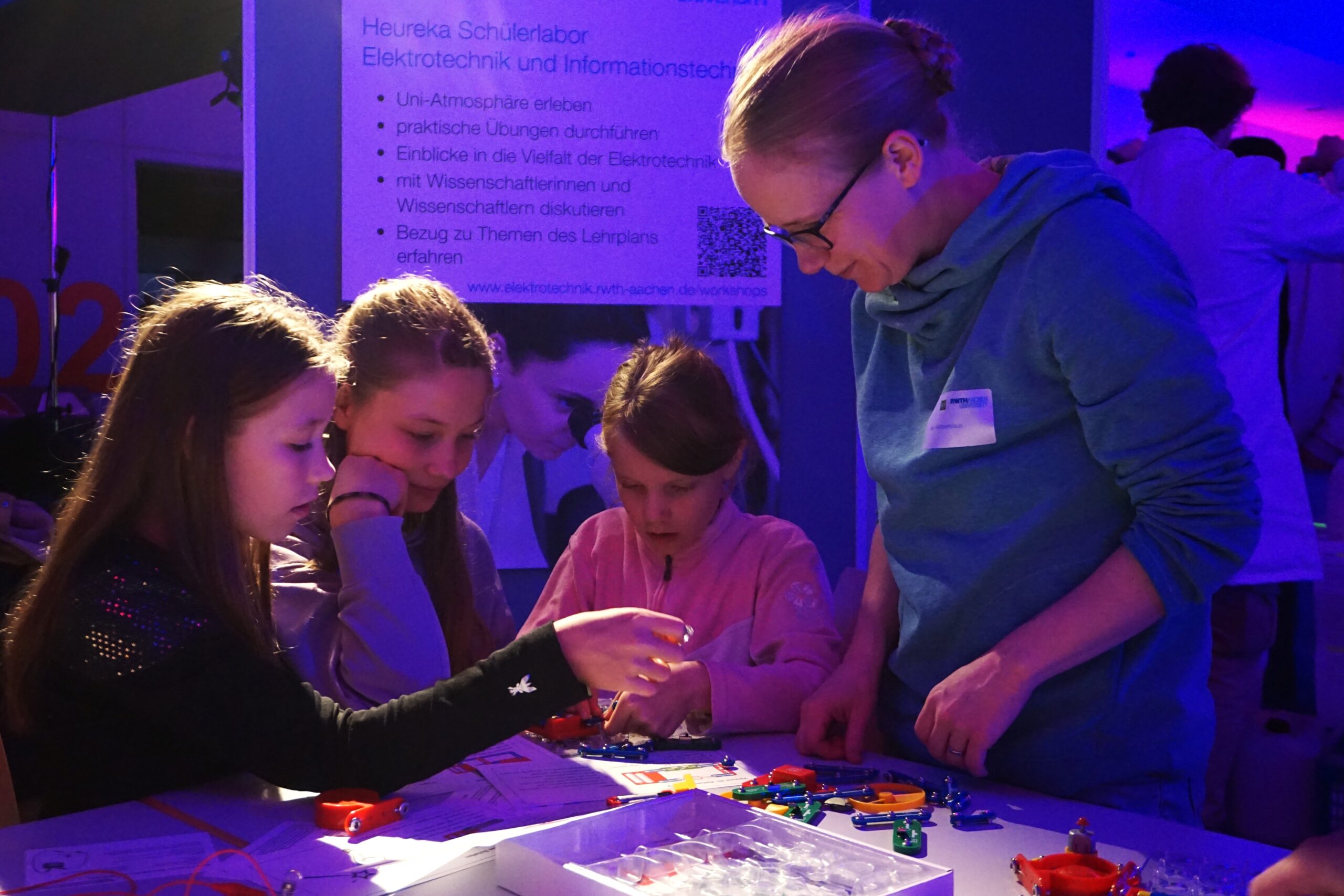
Faculty members provide support when experimenting with electric circuits
Older children ‘already had this at school’ and enjoyed putting their theoretical knowledge to the test. But adults also found their way to our station, taking the opportunity to generate lightning with the influencing machine, thoughtfully lingering in front of the floating globe, or attentively studying the model of the power distribution network set up by the Chair of Automation of Complex Power Systems. The joy of experiencing research and progress together is clearly at the centre of the Science Night.
„We want to show in an entertaining way what RWTH has to offer – and in such a way that everyone who wants to know something can understand it,’ said Rector Ulrich Rüdiger.
The potential of the Science Night is therefore even greater, as it represents an important interface where the direct transfer of knowledge takes place in a social and cultural context. In line with the motto ‘from the laboratories to the people’, it makes an important contribution to promoting proximity between science and society.
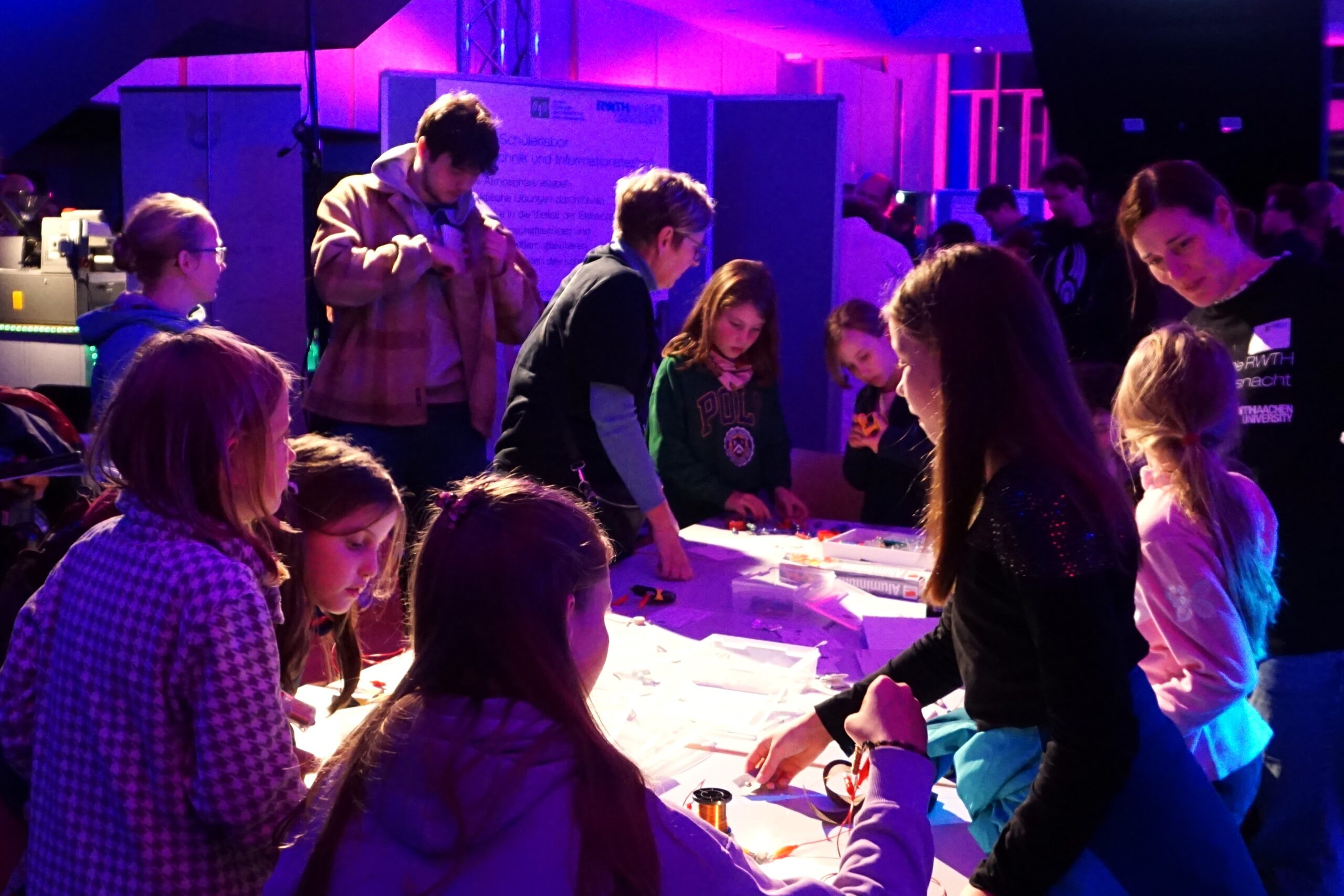
The station of the Faculty of Electrical Engineering and Information Technology, equipped with numerous child-friendly experiments
The programme for this year’s Science Night took place in ten lecture halls and numerous seminar rooms. There were over 80 shows and lectures, experiments, talks and discussions. From Artificial Intelligence (the experts from the RWTH’s AI Centre had brought along the robot ‘Pepper’ for support) to the ‘Physics Fair’, from the latest information on the US elections and the spectacular ‘Fascination of High Voltage’ to the circular economy, floating Teslas and the construction site of the future. The range of topics was as colourful and diverse as the RWTH itself.
Further information on the programme, as well as impressions and experiences of the organisers – Department of Press and Communication, Section 3.2 – can be accessed via the links.
‘Colloquium Biomedical Engineering and Related Fields’ – Invitation to the current lecture
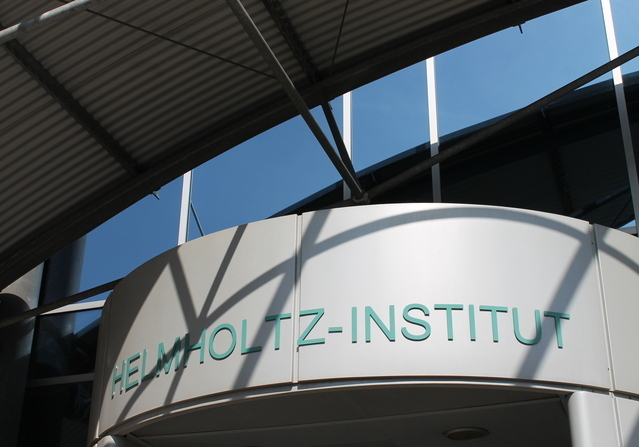
The lecture, entitled ‘Electrical impedance of muscle: from muscular dystrophy to Mars’, will be moderated by Professor Steffen Leonhardt, Chair holder of the Medical Information Technology (MedIT) at the Helmholtz Institute for Biomedical Engineering at RWTH Aachen University, on Wednesday, 25 September 2024.
In his presentation, Dr Seward B. Rutkove, Nancy Lurie Marks Professor of Neurology, Harvard Medical School Chair, Department of Neurology, Beth Israel Deaconess Medical Center, will talk about innovations in the field of skeletal muscle electrical impedance. His lecture will focus on primary disorders that impact muscle, including muscular dystrophies, amyotrophic lateral sclerosis, muscle injury and the effects of unloading, such as those caused by microgravity or partial gravity. He will then discuss methods and technologies for measurement, and review the data collected in a wide range of conditions in both human and animal models.
„It is necessary to clarify which analytical approaches are currently available and in which direction future research will go“,
indicates Dr Rutkove in his abstract, setting the scene for the discussion that will follow.
The ‘Colloquium on Biomedical Engineering and Related Areas’ is a regular series of events organised by RWTH Aachen University. The objective of the series is to facilitate interdisciplinary education in these fields and to encourage the interdisciplinary exchange of ideas.
A cordial invitation is extended to all students, clinicians, engineers and scientists to attend this illuminating lecture and engage in discourse with experts in the field of biomedical engineering.
The event will take place from 5 to 5:45 pm at the Helmholtz Institute for Biomedical Engineering at RWTH Aachen University, Pauwelsstraße 20, 52074 Aachen, Germany, seminar room 2.70. It will be coordinated by Prof. Dr. Klaus Radermacher, Chair of Medical Engineering, RWTH Aachen University. For further information please contact the secretariat at meditec@hia.rwth-aachen.de or call +49-(0)241-80 23870.
Visit from Professor Mohamend-Ali Belabbas
Pr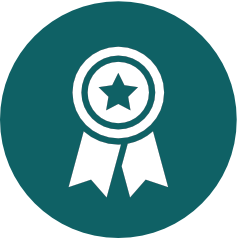 ofessor Mohamed-Ali Belabbas, this year’s winner of the ‘Friedrich Wilhelm Bessel Research Award’ from the Alexander von Humboldt Foundation, is visiting the Chair of Intelligent Control Systems during August.
ofessor Mohamed-Ali Belabbas, this year’s winner of the ‘Friedrich Wilhelm Bessel Research Award’ from the Alexander von Humboldt Foundation, is visiting the Chair of Intelligent Control Systems during August.
The Chair of Intelligent Control Systems will be the host during the funding period.
We congratulate the award winner and wish him a pleasant stay.
Further information on the sponsorship can be found on the website of the Alexander von Humbold Foundation.
WirtschaftsWoche University Ranking 2024 confirms excellent reputation in the business world
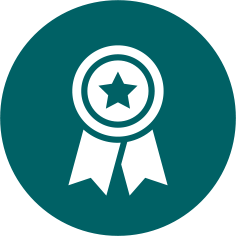
Electrical engineering graduates will have excellent career opportunities in the coming years. But where can prospective students expect the best education?
The consulting firm Universum asked 483 corporate recruiters which university best prepares its graduates for the needs of their companies. The results confirm the outstanding role of RWTH Aachen University in research and teaching: a degree from RWTH is seen to provide optimal preparation for professional life and its associated demands on graduates. Electrical engineering at was ranked third in Germany. About one-third of the surveyed recruiters indicated that they would prioritize hiring graduates from RWTH.
Michael Vorländer is new president of the ASA
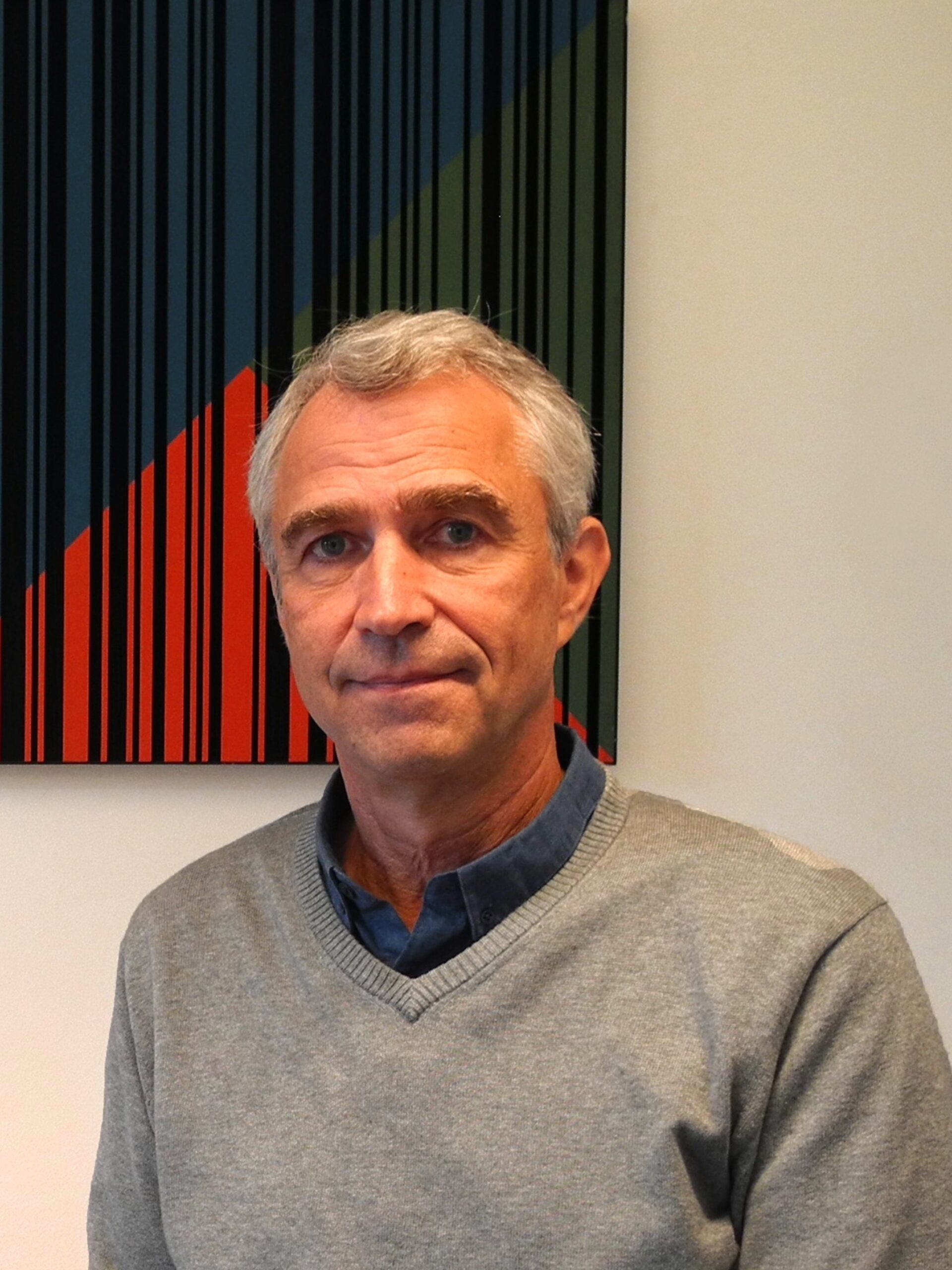
© IHTA
The first non-American president of the Acoustical Society of America (ASA) is Professor Michael Vorländer, Chair of Technical Acoustics at RWTH Aachen University.
Founded in 1929, the ASA is the world’s largest professional society in the field of acoustics. Professor Vorländer will serve as a member of the ASA Board of Directors from May 2024 to May 2027 and as President in 2025/2026.
“It is a great honour to be elected President of the ASA. Being the first non-American President is an important step for international cooperation in acoustics and underlines the increasing importance of international perspectives in the scientific community”,
says Vorländer.
With approximately 7,000 members, the ASA is dedicated to the advancement and dissemination of knowledge in the field of acoustics. The society covers a broad spectrum of acoustical disciplines, supports research, education and application of acoustical principles, develops standards and guidelines, organises conferences and publishes scientific journals such as the renowned “Journal of the Acoustical Society of America”.
For more information about the Acoustical Society of America, please visit their website.



